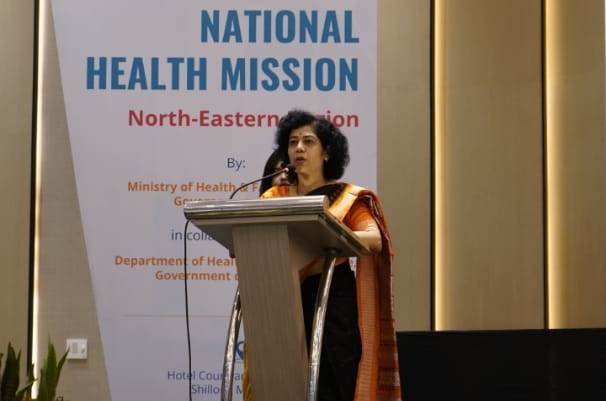To improve healthcare facilities to the last mile in the northeastern state, Shillong hosted a first-of-its-kind Regional Workshop where health experts gathered for brainstorming sessions.
Organised by the Ministry of Health, Government of India in collaboration with the Department of Health and Family Welfare, Government of Meghalaya, the workshop, the two-day workshop held on May 3 and 4 saw the attendance of health officials, experts, and stakeholders from across the region.
In his address, Apurva Chandra, Secretary, Ministry of Health and Family Welfare Department, Government of India noted that this conference will facilitate the sharing of best practices and innovative solutions among states.
The ratio of health facilities in Meghalaya is higher compared to other northeastern states. He affirmed that telemedicine holds great promise for the northeast, given its geographical challenges.
During a session, Sampath Kumar, Principal Secretary, Department of Health and Family Welfare, Government of Meghalaya, stated that the success of the Rescue Mission along with NHM in reducing maternal and infant deaths reflects commendable progress.
The Chief Minister’s Safe Motherhood Scheme, aimed at upgrading facilities and ensuring institutional delivery, especially for high-risk pregnancies, transit homes managed by SHGs, transport support, and incentives for TBA, underscores the state’s commitment to maternal and child health.
These initiatives demonstrate Meghalaya’s proactive approach to improving healthcare and addressing critical health challenges, ultimately contributing to the welfare of its citizens.
Kumar added that the Sstate government has identified 1700 villages to put up community nurses by nominating members from the Village Health Councils (VHCs) where they would be involved in community participation.
The National Health Resource System Centre (NHRSC) surveys indicate that 93 percent of patients in Meghalaya obtained medications from government-operated health facilities, highlighting Meghalaya’s exceptional performance as an outlier in 2023
Aradhana Patnaik, Mission Director, NHM & Additional Secretary, Ministry of Health & Family Welfare, stressed that each of the state’s health facilities should maintain minimum standards following the Indian Public Health Standard (IPHS) guidelines. Moreover, she commended the performance of Meghalaya’s Village Health Councils (VHCs) and urged other northeastern states to emulate their example and learn.
The health experts and officials undertook a field visit at various health centres in Shillong, Sohra, Mawphlang, Mawngap, Mawkdok, Jongsha, Thynroit and other healthcare facilities which was followed by thorough presentation on critical topics such as Service Delivery in Comprehensive Primary Healthcare (CPHC) with an emphasis on an expanded range of services through an integrative approach, continuum of care with PMJAY linkages, wellness and health promotion, drugs, and diagnostics, as well as quality and patient safety.
One of the workshop’s highlights was the practice presentation of Meghalaya’s ASHA First. Launched by Chief Minister Conrad K Sangma in 2022, “ASHA First” application is a re-engineered process of payment for ASHA workers where an ASHA can check her claims and track approval and payments.
Chandra, Secretary, Health Department, Government of India, visited the Northeastern Indira Gandhi Regional Institute of Health & Medical Sciences (NEIGRIHMS) and the New Undergraduate Medical College, Regional Cancer Center, Nursing College, Virtual Autopsy, New CATH LAB, and the New Construction Critical Care Block- 150 Bedded.
The workshop witnessed insightful technical sessions and presentations showcasing the best practices and innovative approaches adopted by various states in the Northeast.


























